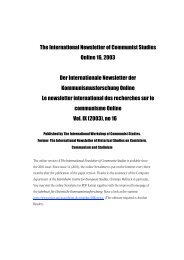VOL. XVI (2010), NO 23 - The International Newsletter of Communist ...
VOL. XVI (2010), NO 23 - The International Newsletter of Communist ...
VOL. XVI (2010), NO 23 - The International Newsletter of Communist ...
Erfolgreiche ePaper selbst erstellen
Machen Sie aus Ihren PDF Publikationen ein blätterbares Flipbook mit unserer einzigartigen Google optimierten e-Paper Software.
<strong>The</strong> <strong>International</strong> <strong>Newsletter</strong> <strong>of</strong> <strong>Communist</strong> Studies Online <strong>XVI</strong> (<strong>2010</strong>), no. <strong>23</strong> 82<br />
<strong>Communist</strong>s' activities as the left wingers actually had not yet entered into some sharp<br />
confrontation with the ruling elites, limiting themselves to verbal declarations.<br />
In December 1919 the Soviet emissary left Mexico heading for Europe accompanied by<br />
Charles Phillips who went with him as an interpreter under the alias <strong>of</strong> Jesús Ramírez. 10<br />
Havana became the first stop on their way to Spain, as we know from Borodin's diary which<br />
is kept in the Amsterdam Bureau collection <strong>of</strong> the RGASPI. 11 <strong>The</strong> Soviet emissary was<br />
giving a characteristic to "Left-Wing Communism" using Cuba's militants as an example: “…<br />
It was therefore that my steamer stopped for some five hours and as they would not let me<br />
go onshore I sent my assistant, a comrade from Mexico, to the town to look up the well<br />
known leader <strong>of</strong> the Cuban working class Salinas and get material on the movement and<br />
what prospects there were for organization <strong>of</strong> the workers on the principle <strong>of</strong> the Third<br />
[<strong>International</strong>]. My Mexican comrade returned in several hours in the state <strong>of</strong> high glee and<br />
extreme happiness. He said that there were not only good prospects for organization but that<br />
in a couple <strong>of</strong> hours a <strong>Communist</strong> section would actually be organized with Salinas himself at<br />
the head and a resolution <strong>of</strong> affiliation with the Third [<strong>International</strong>] adopted, dictatorship [<strong>of</strong><br />
the proletariat] etc. To my question why “section” and not party he answered: Because they<br />
do not believe in such things. For them ‘Party’ is a forbidden word.” 12<br />
<strong>The</strong> case <strong>of</strong> the foundation <strong>of</strong> Cuba’s “<strong>Communist</strong> Section” was quite indicative. As in a<br />
curved mirror, it reflected the events which had taken place some weeks earlier within the<br />
Mexican left-wing movement. While Borodin needed only several days or weeks in Mexico to<br />
bewitch the minds <strong>of</strong> the Socialist leaders and to convince them to transform their party into a<br />
<strong>Communist</strong> one, Phillips (newly converted into the <strong>Communist</strong> faith by Borodin) managed to<br />
do the same with the Cuban working class militants in several hours only.<br />
Borodin arrived in Spain either in late December <strong>of</strong> 1919 or in early January <strong>of</strong> 1920. <strong>The</strong><br />
assumption that Borodin “helped to organize workers on unsuccessful revolt against general<br />
Miguel Primo de Rivera” 13 is not supported by any pro<strong>of</strong>s, and it is enough to say that Primo<br />
de Rivera came to power on September 13, 19<strong>23</strong>. However, the Soviet emissary was quite<br />
preoccupied with the organization <strong>of</strong> the Spanish left wing movement.<br />
Borodin, as far as one can conclude, had rather poor information on the development <strong>of</strong> local<br />
Socialism and did not have any idea whom he could trust. Neither the strong strike<br />
movement which shook Spain in 1916-1917, nor the political crises <strong>of</strong> 1917 were known to<br />
the Comintern agent. In fact, he could have got some fragmentary information only from<br />
Mexican socialists, and those, in turn, were informed by Spanish anarcho-syndicalists exiled<br />
to Latin America. No need to wonder that Moscow’s emissary decided to use methods<br />
already well-proven in Mexico: he asked Phillips to look through the Spanish newspapers.<br />
Some names were mentioned in a context considered “significant” by Borodin and,<br />
consequently, his interpreter established contacts with different people and later presented<br />
some <strong>of</strong> them to his superior. Among these “Spanish contacts” were Pr<strong>of</strong>essor Fernando de<br />
10 Manabendra Nath Roy: Memoirs, Bombay, Allied Publishers, 1964, p. 341-347, 533-539; M. Gomez: From<br />
Mexico to Moscow. In: Survey (London) (1955), N° 55, p. 40. Some authors mention different personas who<br />
supposedly accompanied Borodin – such as Roy (see: Eduardo Comín Colomer: Historia del Partido Comunista de<br />
España. Abril 1920 - febrero 1936, Madrid, Editorial Nacional, 1967², p. 36) or Manuel Díaz Ramírez (see: Víctor<br />
Alba: El marxismo en España. 1919-1939, México, Costa-Amic, 1973, p. 12; Branko Lazitch, Milorad M.<br />
Drachkovitch: Lenin and the Comintern. I, Stanford, Hoover Institution Press, 1972, p. 153). <strong>The</strong> last error was<br />
caused, most probably, by two different aliases used by Phillips – “Manuel Gómez” and “Jesús Ramírez”.<br />
11 „Notes <strong>of</strong> M. Borodin about meetings with party representatives“, RGASPI, 497/2/7.<br />
12 RGASPI, 497/2/7, 92.<br />
13 <strong>The</strong> New York Times, September 3, 1953.














